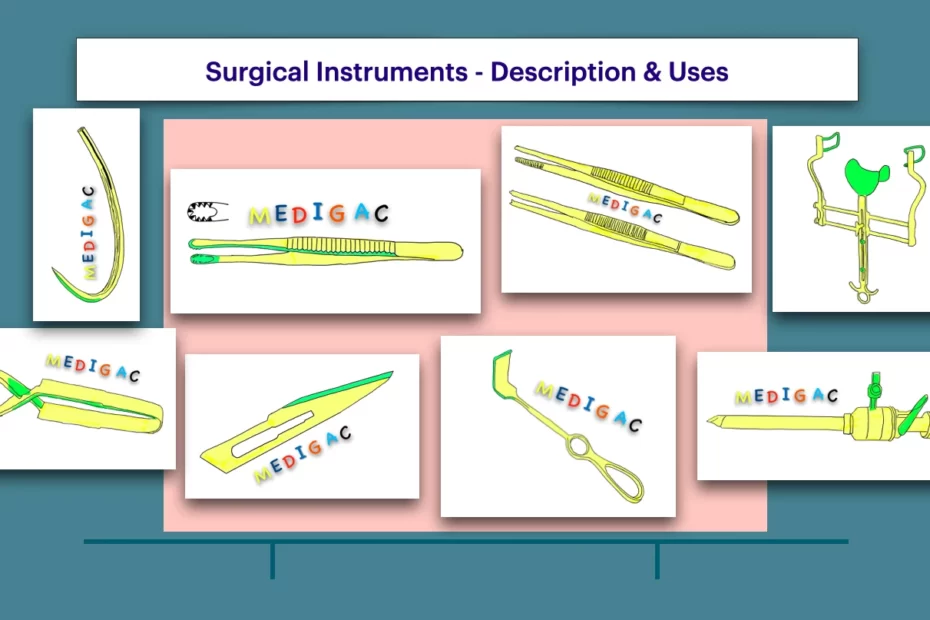We have made all the SURGERY Instruments full set or list with the Names, Description, Uses with Pictures. in you medical ward you will see all this instruments/equipments/devices. So full knowledge regarding all this devices is necessary for your medical and surgical practice and also during exams.
ARTERY FORCEPS/HEMOSTATIC FORCEPS
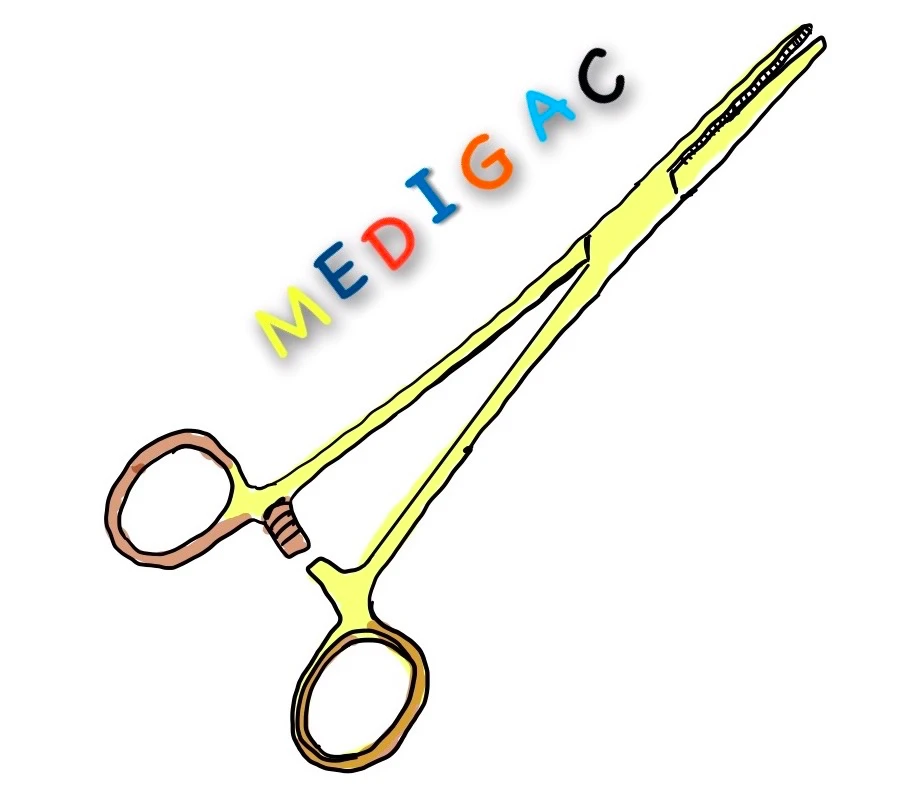
Description :
Made up of stainless steel and has 6 parts :
- Finger Ring
- Ratchet
- Shank
- Box Joint
- Jaws which are serrated from inside
Uses :
- To hold the bleeding vessels.
- Used to cut the margin of rectus sheath, linea alba, external oblique aponeurosis and surgical peritoneum.
- In intestinal resection, the mesenteric vessels are held in between homeostatic forceps and we divide the line of mesentery which is needed.
- To split the internal oblique and transversus abdominis muscle in Appendicectomy.
- Blunt dissection : during lymph node biopsy, excision of lipoma and sebaceous cyst.
- In venesection, it can be used to dissect the vein.
ALLIS TISSUE FORCEPS

Description :
Made up of stainless steel and has 6 parts :
- Finger Ring
- Ratchet
- Shank
- Box Joint
- Jaws which are serrated from inside
Uses :
- Laparotomy : To retract the skin margins while linea alba is incised.
- Holding tough structures : skin margins in incisional hernia operation, raising skin flaps in thyroid operations and neck dissection, cut margins of the bladder in transvesical prostatectomy or suprapubic cystolithotomy, neck of the bladder, skin flaps in craniotomy.
RAMPLEY SPONGE HOLDING FORCEPS

Description :
Made up of stainless steel and has 6 parts :
- Finger Ring
- Ratchet
- Shank
- Box Joint
- Jaws which are serrated from inside
Uses :
- Holding : Used to hold Sponge ,Cotton Swabs, or a gauze piece for cleansing the skin the skin area before the operation.
- In Cholecystectomy : To hold the fundus and Hartmann’s pouch of the gallbladder.
- Sometimes it is used to clean the suture line in gastrojejunostomy, small and large gut anastomosis.
- In Hydatid cyst : It is used to remove the covering membranes and daughter cyst during surgery.
- Sometimes it may be used as Ovum forceps, tongue holding forceps.
FOLEY’S SELF-RETAINING BALLOON CATHETER

Description :
This device is made up of PVC material and has mainly four parts :
- Balloon port
- Urine drainage port
- Balloon
- Bladder opening
Uses :
- For relief of retention of urine by catheterisation.
- Used in various surgeries like prostatectomy, cystostomy, nephrostomy etc.
- Used in various surgeries for drainage of fluid : in mastectomy.
- Can be used as tourniquet in venipuncture.
LANGENBECK RETRACTOR

Description :
Also called Right angle retractor.
Made up of stainless steel and has a ringed handle and a blade at the proximal end which is at right angle with the handle and the neck.
Uses :
1. Better Visualization : For better visualisation pulling back of soft tissues, incision or wound edges during surgeries.
DISSECTING FORCEPS

Description :
This forceps has two arms and has spring mechanism.
—The tips are grooved.
Uses :
Dissecting and Suturing : Mostly used in dissection to hold tissues – Other than dissecting it can be used in holding suture and needle.
- Holding delicate structures like peritoneum, vessels, nerves, and muscles during dissection and suturing.
- Appendicectomy : To bring out the cecum with delivering of the appendix.
- GI surgeries like gastrojejunostomy, anatomoses, to hold the gut margins during suturing.
- To hold the hernial sac during hernia operation..
TOOTHED FORCEPS

Description :
There are two arms which works by spring mechanism
—Teeth present in each jaws.
Uses :
- While plain forceps is used to hold delicate structures, toothed forceps is used to hold tough structures like skin, fascia and aponeurosis.
- To hold the cut margins of linea alba, rectus sheath etc.
- To hold the scalp in craniotomy.
NEEDLE HOLDER
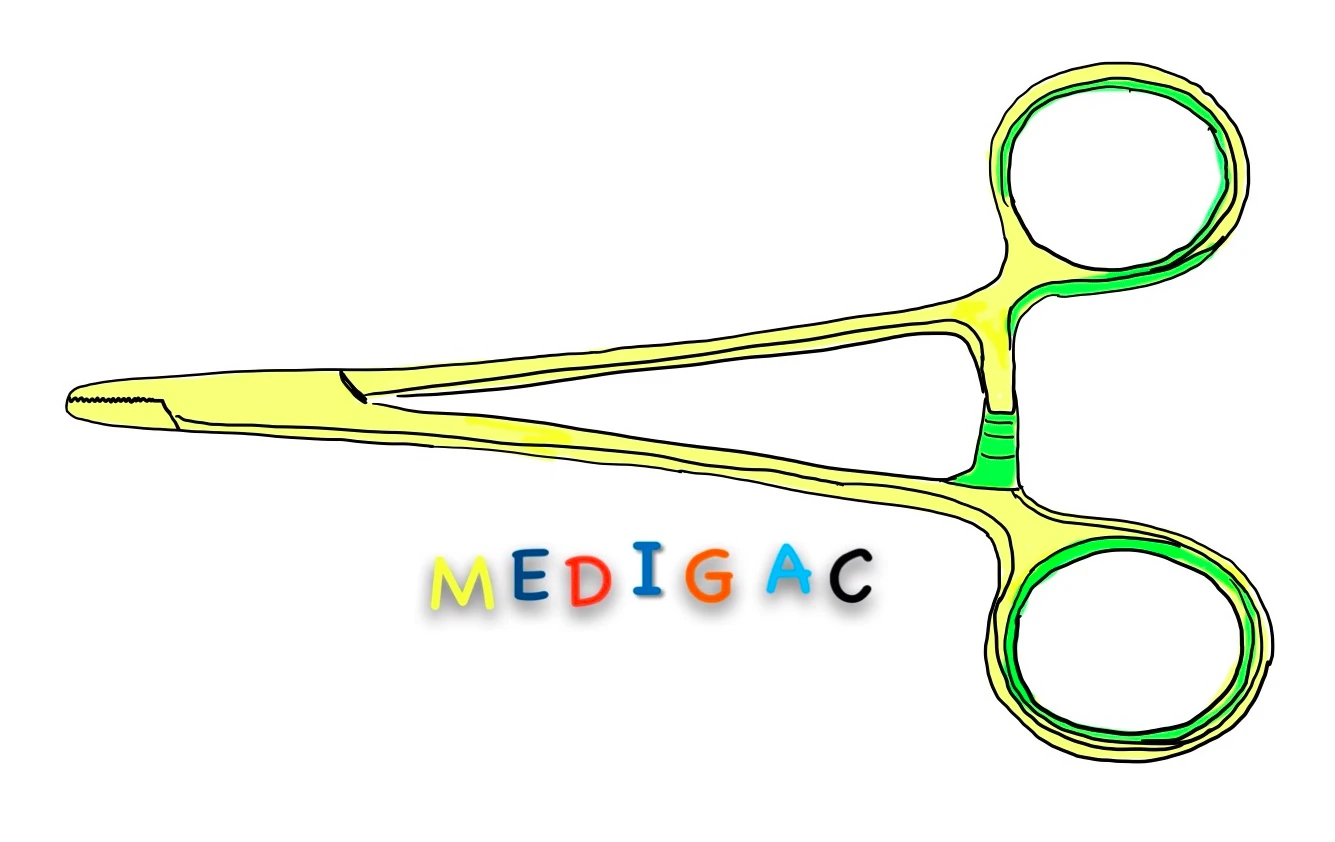
Description :
Forceps like structure made up of stainless steel.
Has mainly 2 parts : The arms and the tips. The arms are connected with each other by a Box joint.
—The tips has grooves.
–The arms has catch mechanism.
Uses :
1.Holding Suturing Needle : Doctors use it to hold a suturing needle for closing wounds during suturing and surgical procedures.
SURGICAL NEEDLE

Description :
This needle is ‘C’ shaped structure and made up of stainless steel and the tips is sharp and pointed.
Uses :
1. Suturing : Used to invade the tissue and carry the suture material during suturing process.
BABCOCK’S TISSUE HOLDING FORCEPS
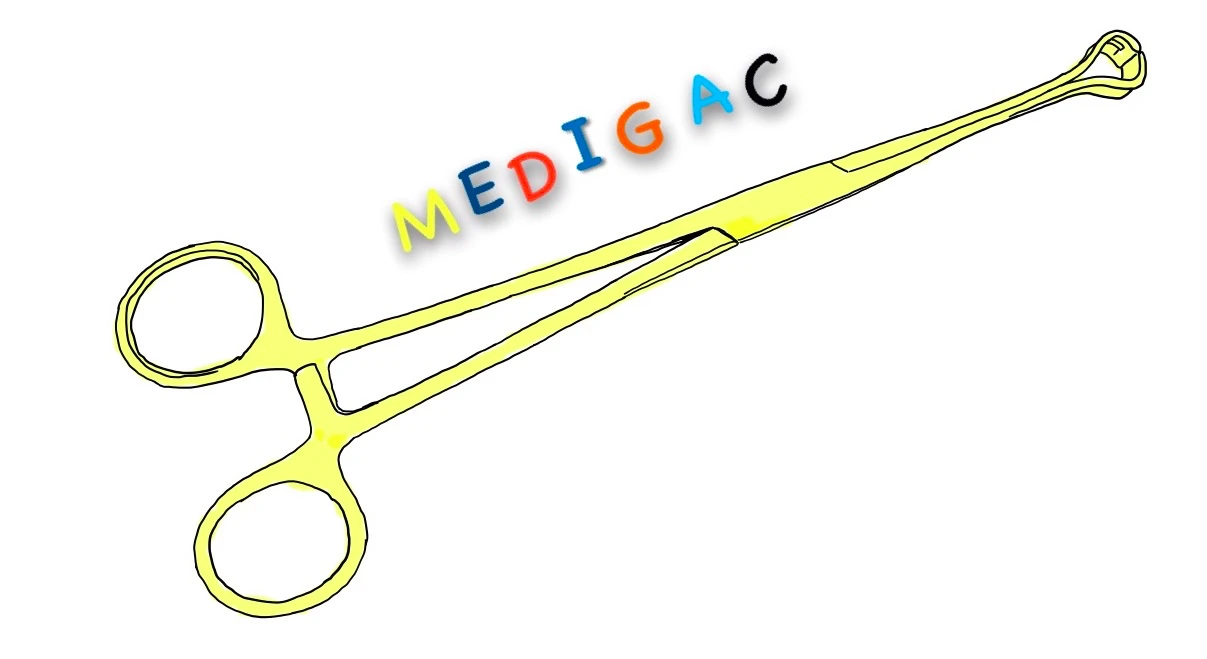
Description :
Made up of 6 parts :
- Ratchet
- Finger Ring
- Shank
- Jaws and curved tips.
- Box Joint
Uses :
This Instruments is similar to Allis tissue forceps, mostly used to hold delicate tissues.
Frequently used in Intestinal and Laparotomy procedures.
Appendicectomy : Used to Hold either Appendix or Caecum during Appendicectomy.
CHEATLE STERILIZER FORCEPS

Description :
Forceps with two arms and tips. The arms are connected with each other by a Box Joint. The tips are single curved at the end point.
Uses :
1. Picking Up : Used to pick up sterilized instruments and gauze pieces.
LINEAR CUTTER

Description :
Made up of plastic handle holding the two blades, two double staggered rows of titanium staples.
—- This helps in cutting and dividing tissues between the two double rows.
Uses :
GI Anastomoses : This instrument has simultaneous capability to cut and staple.
So we use this:
- Bowel Anastomosis
- Sleeve Gastrectomy
LANE TISSUE HOLDING FORCEPS

Description :
Made up of stainless steel and has two arms and curved ring like tips.
—-There is a Box Joint present to connect the two arms.
Uses :
1. Tough or Bulky Tissue : Used to hold tough/bulky tissues for skin apposition.
2. Biopsy : Holding the lymph node for Biopsy sample.
3. Appendectomy : Holding the Appendix in Appendectomy.
CIRCULAR STAPLER

Description :
Made up of plastic handle and has a metallic circular long structure which has stapling end which helps to staple.
Uses :
Anastomosis : For making end-to-end Anastomosis after bowel resection or in esophagogastric surgery
RUSSIAN FORCEPS
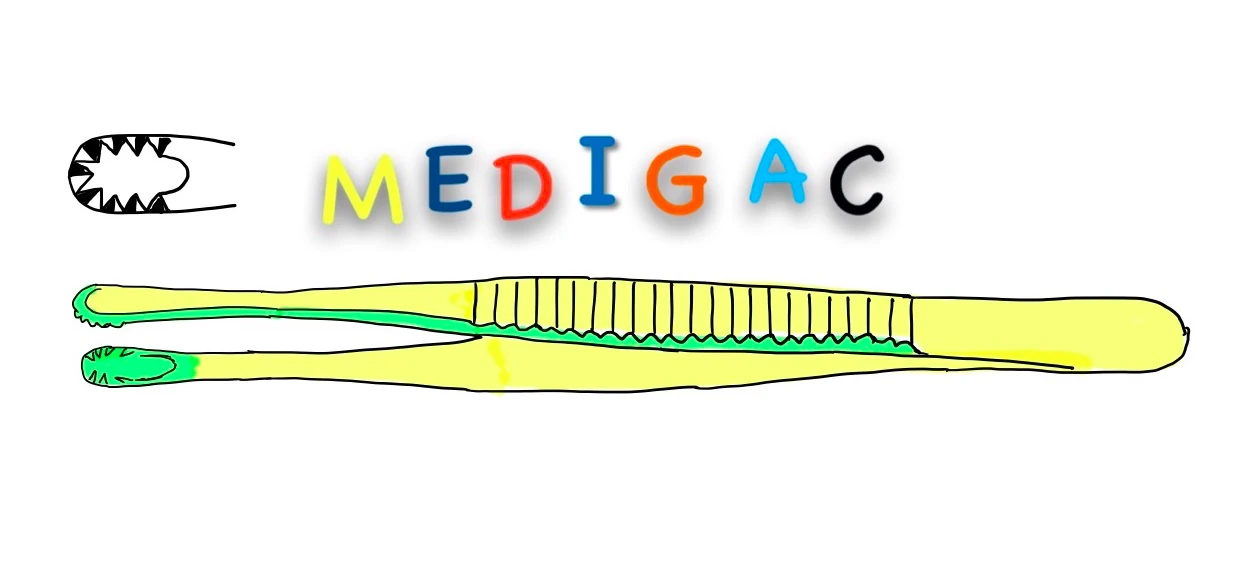
Description :
The two arms works by spring mechanism and the jaws has serration.
—–Grooves are present in arms for better grasping.
Uses :
1. Grasping Tissues : For holding heavy and thick Tissues.
KOCHER’S HEMOSTATIC FORCEPS

Description :
Made up of stainless steel and has 6 parts :
- Finger Ring
- Ratchet
- Shank
- Box Joint
- Jaws which are serrated from inside
Uses :
- Used to hold the cut vessels in various surgeries like – Mastectomy, craniotomy, palm and sole operations.
- In Appendicectomy : Used to crush the base of the appendix.
- Obstetrics use : To perform artificial rupture of membrane.
ARMY NAVY RETRACTOR

Description :
Made up of stainless steel and has a Handle and the two ends are curved.
Uses :
1. Retraction : It is made to retract the edges of the wound and increases the visibility for the surgeon.
Used in :
- Appendectomy
- Breast Biopsy
CAT’S PAW RETRACTOR
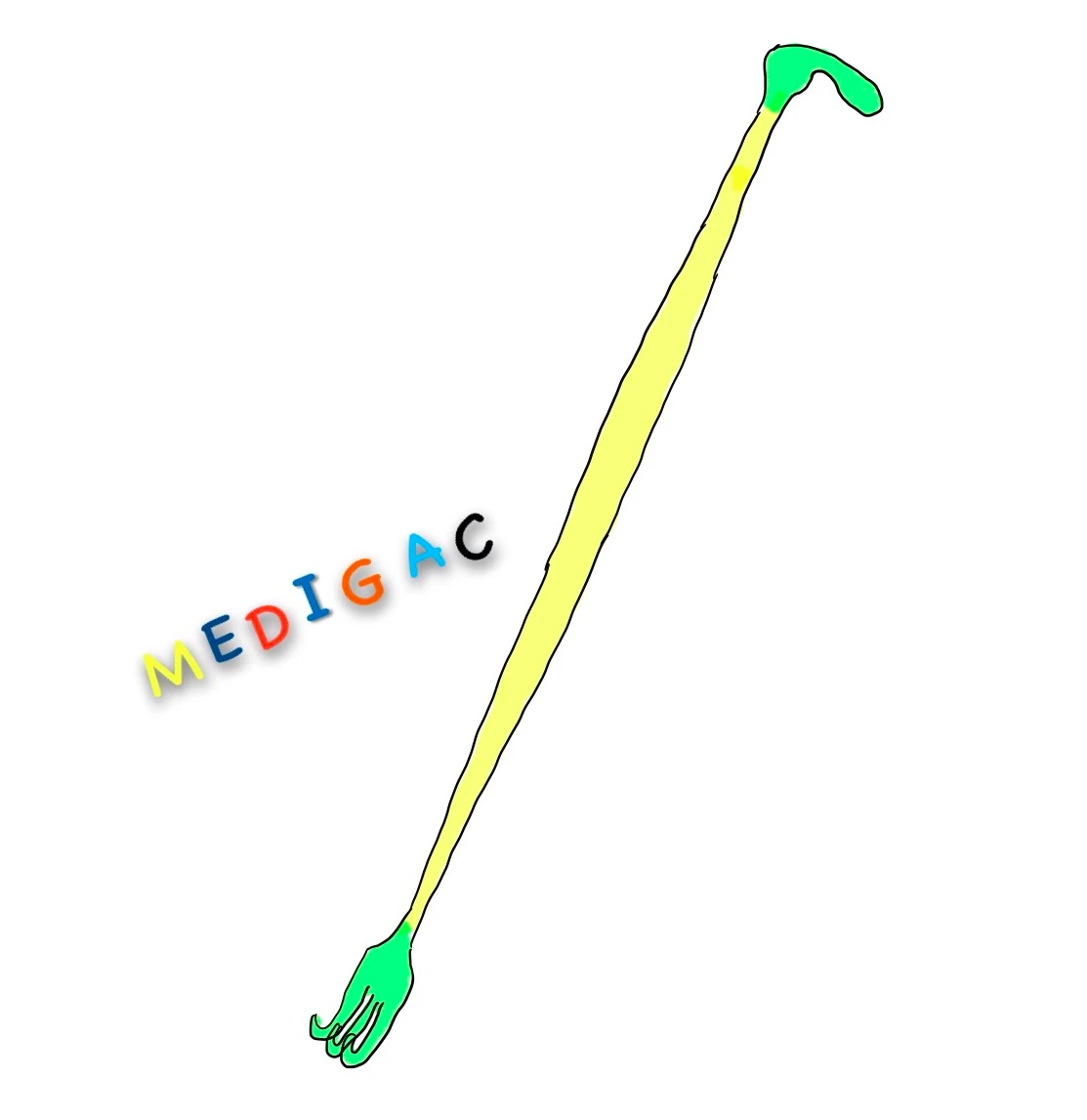
Description :
It is a double ended long structure, the ends are bend downwards and having multiple hook like projections.
Uses :
Used to retract the skin during minor surgeries like :
- Lacrimal Surgery
- Lid Surgery
CZERNY RETRACTOR
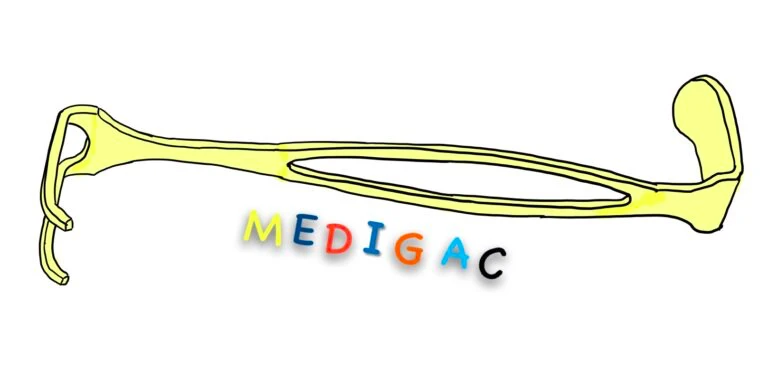
Description :
This retractor has two spikes on one end and a broad surface on the other end.
Uses :
- Appendicectomy : To retract the abdominal wall
- Retraction of skin :Used in superficial extraction of skin during Laparotomy.
- Thyroidectomy : To retract the muscles of neck.
DEAVER’S RETRACTOR
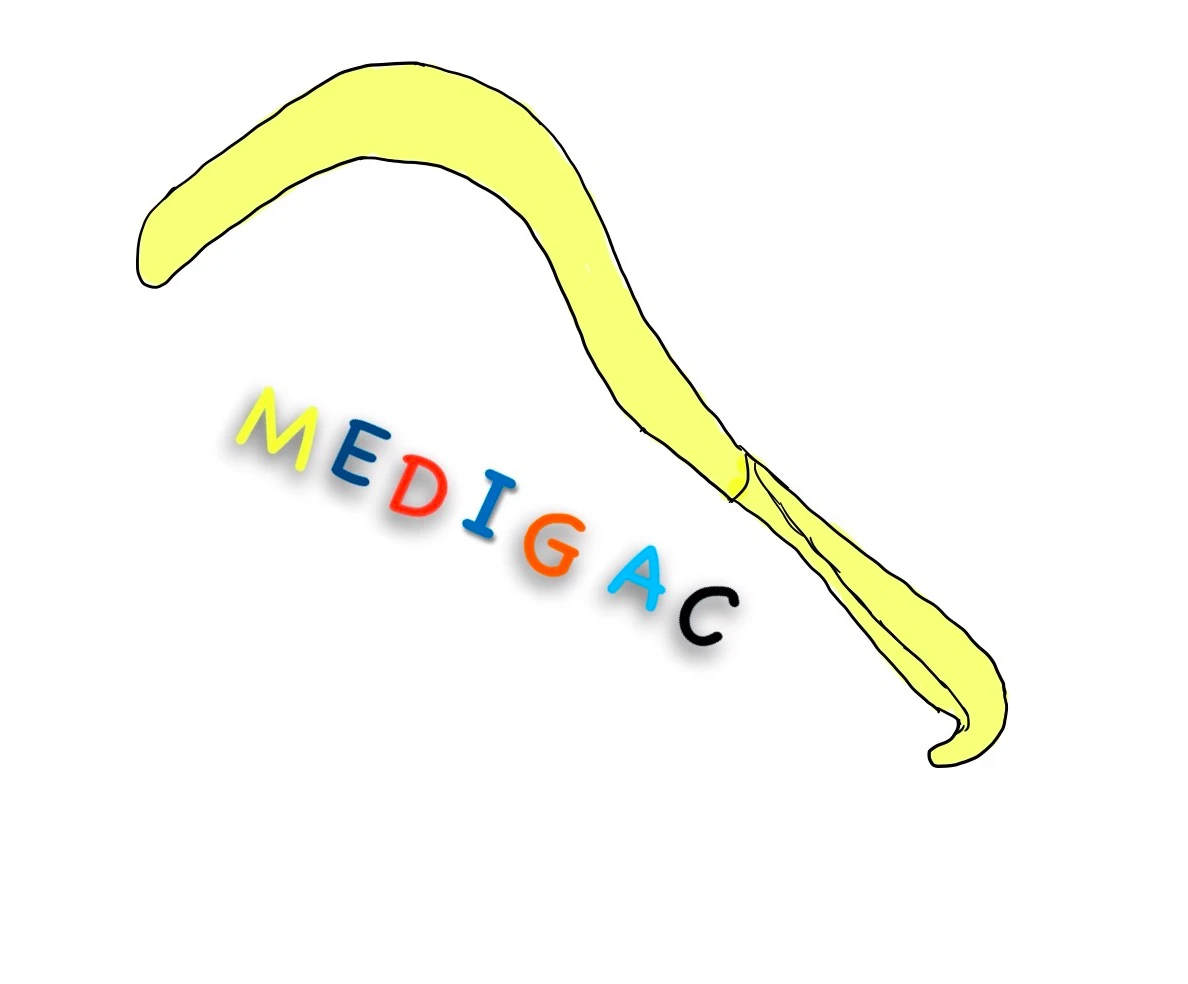
Description :
Made up of stainless steel and has a solid handle. The proximal end of this retractor is curved.
Uses :
Used to hold the edges of an abdominal or chest incision open so that the surgeon is able to reach underlying organs.
- Liver retraction : In GI surgeries we mainly use this instrument to retract the Liver.
- Abdominal wall can be retracted.
DOUBLE HOOK RETRACTOR
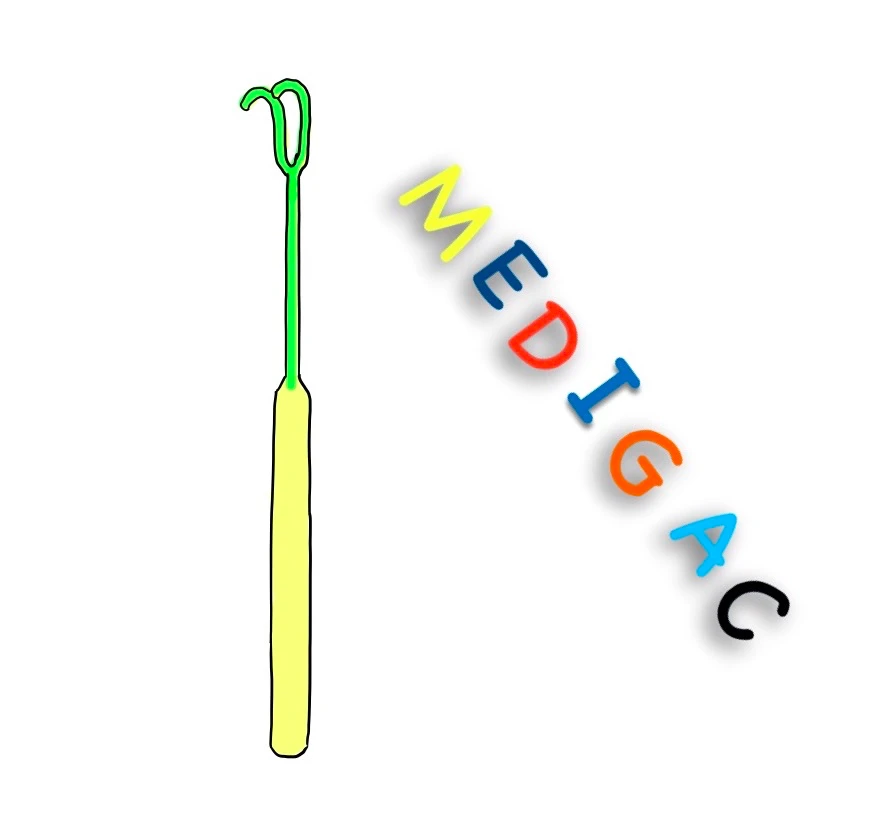
Description :
Made up of stainless steel and has mainly two parts :
Handle and two Hooks at the tip.
Uses :
Used to retract the tissues :
1. Skin Flap : Used to retract the skin flaps to remove the Sebaceous Cyst.
2. Venesection : Used during puncturing in the vein for retraction of the skin.
3. Tracheostomy : Also used in Tracheostomy for retraction of the skin and the thyroid isthmus.
MORRIS RETRACTOR

Description :
Made up of stainless steel and has has a long and slim neck which bends at a right angle to form a flat transversely curved blade.
Uses :
Mainly used for retraction of strong structures like abdominal wall muscles which provides wider space to work.
1. Closing Abdominal Incision : During the closing we use it to retract the skin for ease of working in the deeper layers.
2. Retraction of Muscle : Used to retract Pectoralis major in MRM for better visualiztion during axillary dissection.
ALLISON LUNG RETRACTOR

Description :
Made up of stainless steeled has mainly two parts :
–Metallic wire making the surface and the Handle.
Uses :
As the name implies “Lung Retractor” ; It is mainly used in cardiothoracic surgery in which it is necessary to retract the lungs.
SINGLE HOOK RETRACTOR

Description :
Made up of stainless steel and has mainly two parts :
Handle and a Hook at the tip.
Uses :
Retraction :
1. To retract skin edges
2. To retract tough fascia
SURGICAL SCALPEL BLADES

Description :
Made up of stainless steel and has a sharp cutting edge.
—-Total number of 39 blades are there.
Uses :
1. Giving Incision : Used during giving any incision in operative procedures.
2. Cutting Skin and Tissue during any Surgery
BARD PARKER(BP) HANDLE

Description :
Long flat serrated handle with a thin solid tip.
Uses :
1. Incision : During providing of an incision and cutting tissues, we use blades which are attached to this BP Handle.
